Q: Why do I think about food all the time?
A: Constant thoughts about food often stem from restrictive eating, emotional triggers, or unmet physical needs. When your body feels deprived—either from dieting or not getting enough nourishment—it fixates on food as a survival mechanism. Addressing both your hunger and emotional triggers can help reduce these 24/7 thoughts.
Written by Jenn Hand, Holistic Nutritionist, Board Certified Health Coach, NBC-HWC
Constantly Thinking About Food?
Many people struggle with constant thoughts about food.
Understanding the reasons behind these thoughts is the first step in regaining a feeling of calm around food and finding balance.
In this post, I’ll explore why you might be thinking about food so often and share practical tips to help you manage those thoughts and build a healthier relationship with food and eating.
As a food coach and emotional eating coach, I help women feel normal around food and become normal eaters again.
What I’ve noticed over the years is that the less satisfying your meals and the more restrictive your eating, the more you’ll find yourself thinking obsessively about food. Finding that balance of eating nourishing foods while not overeating is important.
Keep reading this post for my story about how I overcame obsessing over food and 11 steps that you can take to stop thinking about food all the time!
Table of Contents
- Why I Used to Think About Food ALL THE TIME
- What Triggers Constant Thoughts About Food?
- 11 Steps to Stop Thinking about Food All the Time
- Understanding the Difference Between Physical and Emotional Hunger
- Homeostatic Pathway
- Hedonic Pathway
- Exploring Other Hunger Triggers
- How Poor Sleep Can Affect Thoughts About Food
- How Under Eating and Restriction Cause Obsessive Food Thoughts
- Incorporating Pleasure and Satisfaction into Your Eating
- Final Thoughts
- Common Questions
Why I Used to Think About Food ALL THE TIME
I remember a time when food ruled my every thought.
I’d wake up thinking about what I was going to eat, spend my days obsessing over calories, and plan my meals based on what I thought was “allowed.” The more I restricted myself with food rules, the more I found myself constantly thinking about what I couldn’t have.
It wasn’t just hunger—I’d think about food when I was bored, stressed, or even just watching TV.
It’s a paradox; the more we try to tightly control our food, the more out of control we actually feel! It wasn’t until I began loosening the grip of food rules that the constant obsession began to soften.
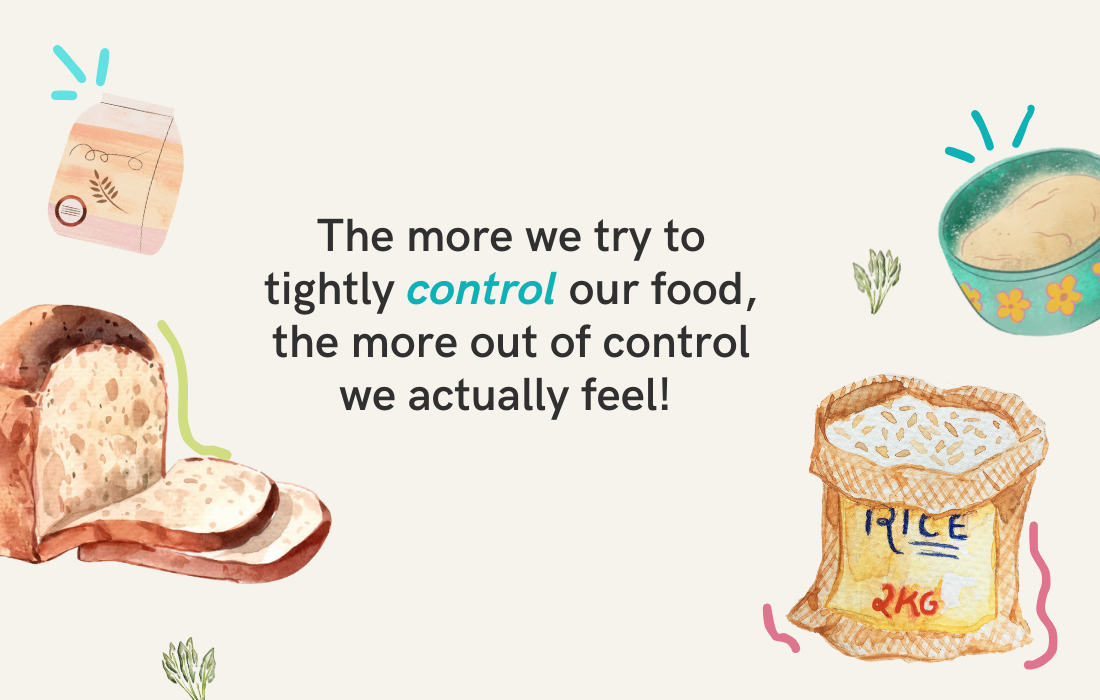
What Triggers Constant Thoughts About Food?
Constant thoughts about food are often triggered by restriction, food rules, and emotional factors like stress or boredom.
When you’re limiting certain foods or constantly dieting, your brain focuses on what’s off-limits, making you think about food more. Emotional triggers like loneliness, anxiety, or even celebrating with others can cause you to fixate on eating.
These thought patterns become even stronger when you’re not honoring your hunger cues or relying on food as your main coping mechanism.
Now that we’ve identified the triggers, let’s dive into 11 practical steps to help you stop thinking about food all the time!
11 Steps to Stop Thinking about Food All the Time
1. Identifying and Honoring Hunger Cues
The first step in stopping constant thoughts about food is learning to recognize your body’s hunger cues.
Pay attention to physical signs like stomach growling or low energy, and honor them by eating when you’re hungry. This helps you trust your body and reduces the mental fixation on food.
2. Showing Yourself Grace and Patience
Change doesn’t happen overnight, so be kind to yourself!
My favorite motto is “pretty good is perfect” to help honor our slow and steady progress. If you slip up or find yourself thinking about food often, remember that it’s part of the process. Progress is more important than perfection.
3. Drinking Enough Water
Cliche, but true! Sometimes, what feels like hunger is actually thirst.
Drinking enough water throughout the day can prevent dehydration, which can mask itself as hunger. Staying hydrated can help reduce unnecessary food cravings and keep your mind clearer (but it’s not meant to be used as a “diet-y” trick to mask hunger but to truly see if you’re hungry or thirsty!)

4. Eating Balanced Meals and Snacks
Eating balanced meals that include protein, fats, and fiber helps stabilize your blood sugar and keeps you fuller for longer.
Regularly eating balanced meals prevents the rollercoaster of extreme hunger and overeating, reducing the mental focus on food. I’m a big advocate or adding protein to your meals and snacks and eating every 3-4 hours as a starting point!
5. Finding Non-Food Coping Mechanisms
When emotions like stress or boredom trigger the urge to eat, having alternative coping strategies is key.
Activities like journaling, breathwork, meditation, or calling a friend can help you deal with emotions without turning to food as a default.
6. Moving Your Body Regularly
Physical activity can help reduce stress, improve mood, and shift your focus away from food.
Whether it’s a walk, yoga, or another form of exercise, moving your body regularly helps release feel-good hormones and supports a more balanced relationship with food.
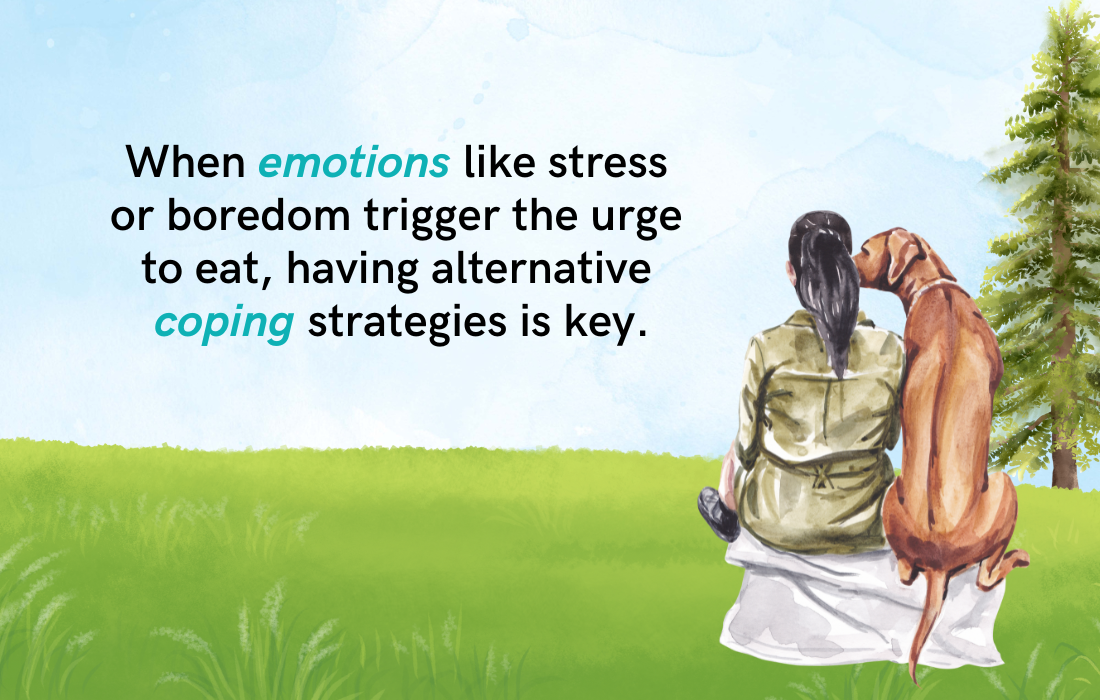
7. Learning to Let Food Thoughts Pass
Not every food thought requires action.
When you notice yourself thinking about food, pause and assess whether you’re actually hungry or just fixating out of habit. Over time, you’ll learn to let those non-hunger-driven thoughts pass without acting on them.
8. Breaking the Guilt and Shame Cycle
So many women I work with feel deep shame from bingeing and overeating.
Food guilt keeps us trapped in a negative cycle where eating becomes tied to emotions like shame or regret. By breaking free from labeling foods as “good” or “bad,” you can enjoy eating without feeling guilty, which lessens obsessive thoughts about food.
Remember that the more you bring these things up for healing, the more the shame softens.
9. Knowing When to Ask for Help
If food preoccupation feels overwhelming, it’s important to reach out for help.
A coach, therapist, or support group can offer support and tools to work through underlying issues and develop a healthier mindset around food.
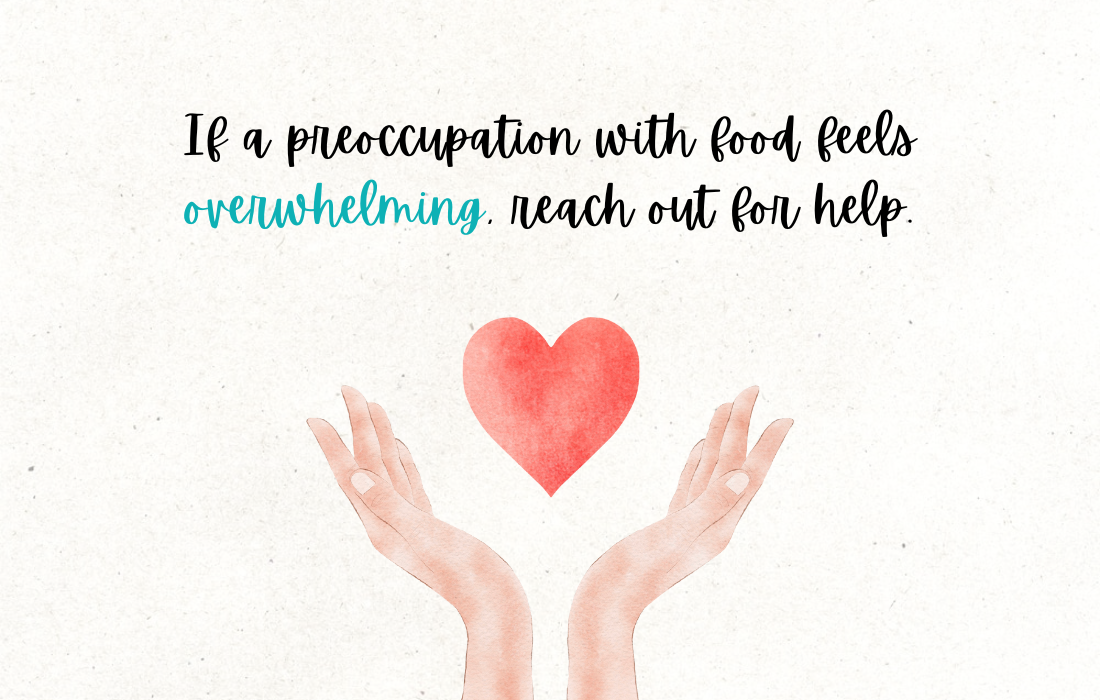
10. Addressing Emotional Eating and Trying Intuitive Eating
Emotional eating is common, but intuitive eating teaches you how to distinguish between true hunger and emotional needs.
By addressing emotional triggers and practicing intuitive eating, you can eat in response to your body’s signals rather than your emotions.
11. Practicing Mindful Eating
Mindful eating encourages you to be fully present while eating, paying attention to the flavors, textures, and sensations of your food.
This practice helps you enjoy your meals more and prevents mindless snacking, reducing the need to constantly think about food. Aim for experimenting with this–not aiming to be perfect!
Understanding the Difference Between Physical and Emotional Hunger
Physical hunger comes on gradually and is satisfied by eating a variety of foods.
While emotional hunger often hits suddenly and triggers cravings for specific comfort foods. Learning to distinguish between the two is key to managing constant thoughts about food.
When you can identify emotional hunger, you can address the underlying feelings instead of using food as a solution. Physical hunger is satisfied with fuel (via energy from your food) whereas emotional hunger isn’t. We typically want “more” since food never truly satisfies the emotional need.
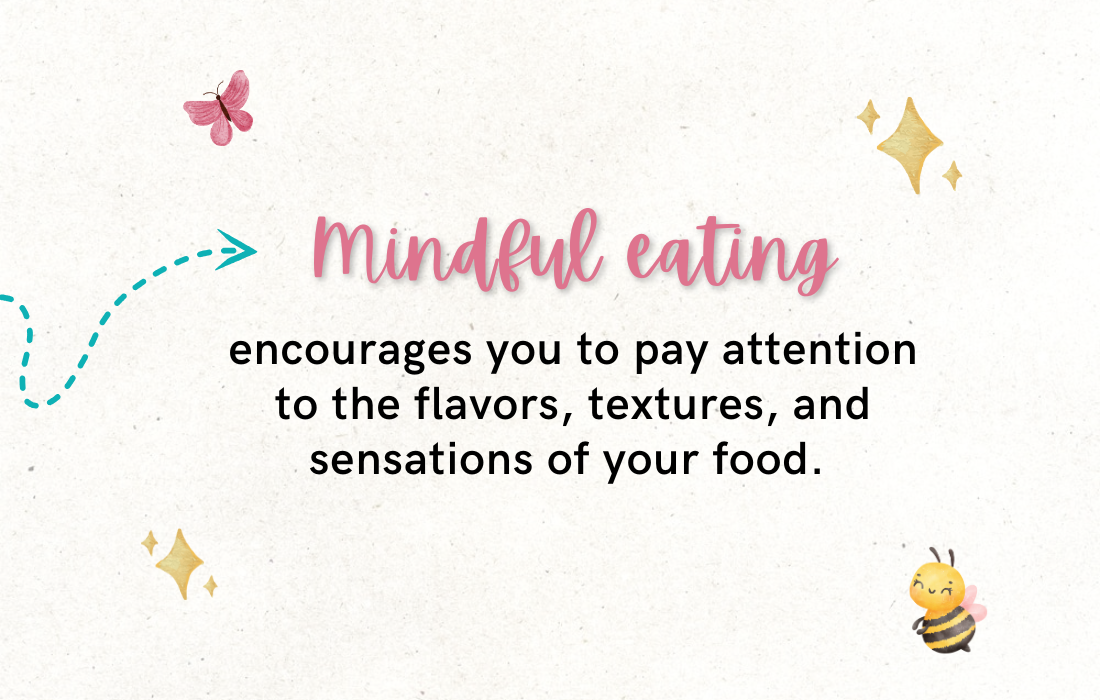
Homeostatic Pathway
The homeostatic pathway regulates hunger based on your body’s actual energy needs.
When your body requires fuel, it sends hunger signals to prompt you to eat. When your energy needs are met, those signals stop, helping to naturally manage your thoughts about food. Tuning into these signals supports more mindful eating and reduces constantly thinking about food.
Hedonic Pathway
The hedonic pathway drives food thoughts based on cravings and the desire for pleasure, even when you’re not physically hungry.
This pathway is activated by tempting foods or emotional triggers, leading to eating purely for enjoyment or because it ‘tastes good.’ Recognizing when you’re eating for pleasure can help you make conscious choices about indulging, without feeling out of control.
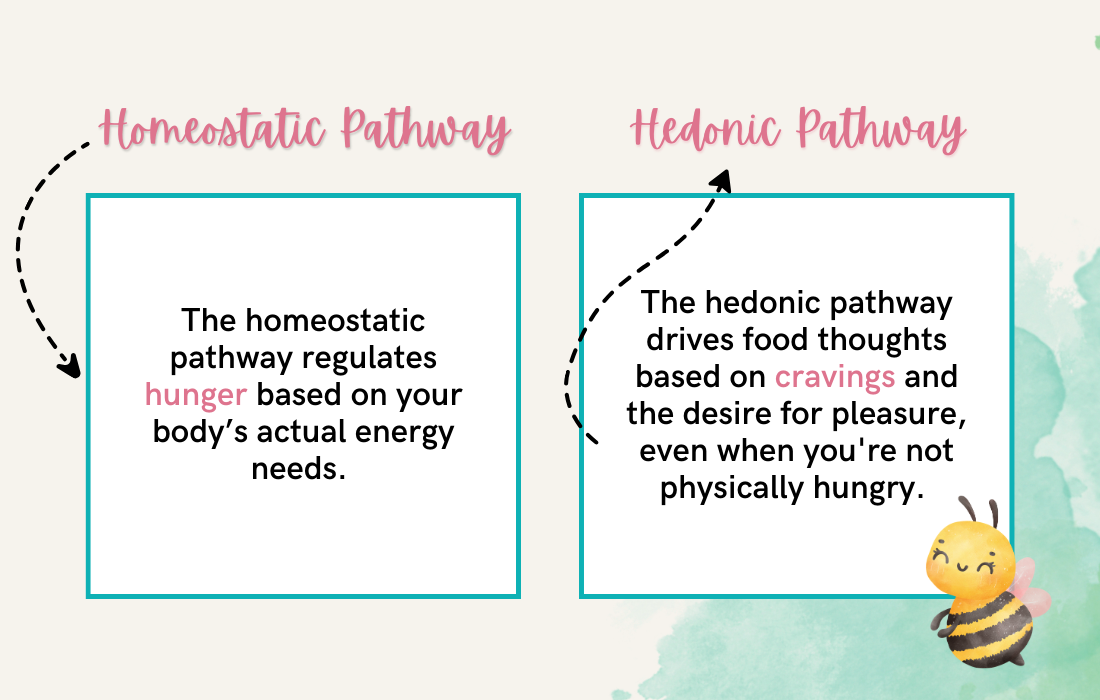
Exploring Other Hunger Triggers
Stress, boredom, and social events can all be triggers for thoughts about food, even when you aren’t physically hungry.
These external cues often lead to eating as a way to cope with emotions or fill time. Understanding these triggers allows you to address the root causes—whether it’s stress relief, finding fulfilling activities, or navigating social pressure.
How Poor Sleep Can Affect Thoughts About Food
Lack of sleep can disrupt hunger hormones and increase cravings for sugary or high-fat foods, leading to more frequent thoughts about food.
When you’re sleep-deprived, your body craves quick energy, which often comes in the form of easily digestible, calorie-dense foods. Prioritizing quality sleep can help reduce these cravings and the mental focus on food.
How Under Eating and Restriction Cause Obsessive Food Thoughts
When you don’t eat enough or restrict certain foods, your body responds by increasing your focus on food.
(Thanks a lot, diet world, for ingraining this restrictive mindset!) This happens because your body is trying to maintain basic metabolic functions and ensure it gets enough nourishment to survive.
Instead of giving you more control, under-eating often backfires, leading to obsessive thoughts and stronger urges to overeat or binge later.

Incorporating Pleasure and Satisfaction into Your Eating
Including satisfying and enjoyable foods in your diet helps reduce obsessive thoughts about food by honoring both your hunger and food preferences.
When you allow yourself to eat foods you genuinely enjoy, your body and mind feel nourished, making it easier to stop worrying about what you “should” eat next. Balancing nourishment with pleasure supports a healthier, more sustainable relationship with food.
Final Thoughts
Managing constant thoughts about food is possible by tuning into your body, allowing yourself to enjoy food, and recognizing triggers that lead to mindless eating.
Remember, food is meant to be a source of nourishment and enjoyment, not stress. The diet world teaches us otherwise, but satisfaction is key to long term sustainable eating! As you practice intuitive eating, you’ll find freedom from food preoccupation and a deeper sense of trust in your body.
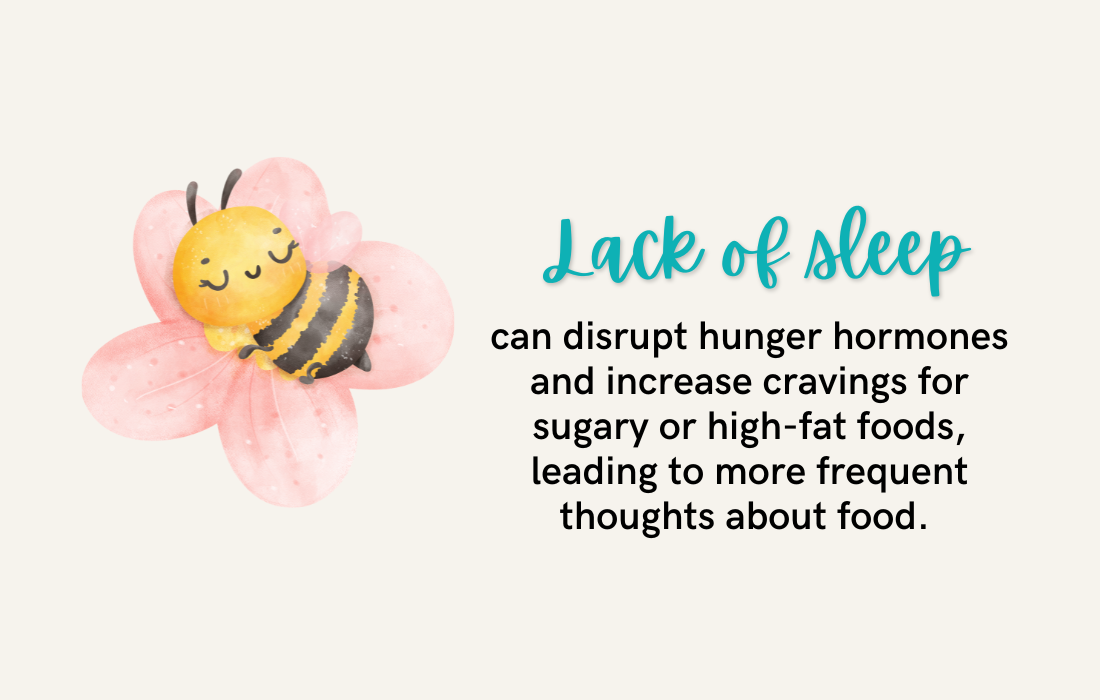
Common Questions
Are hunger hormones a real thing?
Yes, hunger hormones like ghrelin and leptin play a role in regulating hunger and fullness.
When you’re dieting or restricting, these hormones can become imbalanced, making it harder to recognize when you’re truly hungry or satisfied.
How can I manage my food intake without obsessing over it?
Focusing on mindfulness rather than calorie counting can help you eat with intention rather than restriction.
Tuning into your body’s signals and eating for nourishment and satisfaction reduces the obsession.
Why do I overthink everything I eat?
Overthinking food is often the result of years of dieting, food rules, or guilt around eating.
Shifting toward a more intuitive approach helps break the cycle of overanalyzing every meal or snack.
How can I stop feeling guilty after eating?
Guilt after eating can be a sign of labeling foods as “good” or “bad.”
High calorie foods don’t mean “bad”…but we can look at what we eat as more or less energizing, more or less nourishing, or whatever word you want (besides good and bad!) By giving yourself permission to enjoy all foods and practicing self-compassion, you can let go of food guilt and trust your body.
How can I lose weight without becoming fixated on food?
Focusing on health-promoting behaviors, rather than weight as a sole measure of success, can help shift your mindset.
Finding a balanced, enjoyable way to move your body and nourish it helps reduce fixation on food.
What’s the best way to control cravings without feeling deprived?
Allowing yourself to eat the foods you crave without labeling them as forbidden often diminishes their power over you.
Cravings usually decrease when you remove restriction and listen to your body’s cues.
Is obsessing over food a result of having a “binge eating disorder”?
Not necessarily.
Obsessing over food can come from many factors, including dieting, emotional eating, or having restrictive food rules. A professional can help you figure out the root cause.
Related Articles
⚪ What Is a Healthy Dessert for Weight Loss?
⚪ How Can Anger Affect Eating Habits?
⚪ What Is Holistic Weight Loss?
Get the Normal Eater’s Newsletter
Join 8000+ women who are overcoming overeating, binge eating, and breaking up with dieting forever. Get Jenn’s inspiring and actionable weekly newsletter with the latest posts, podcasts, and tips on how to love your body, find food freedom, and lose weight holistically.
Get the Normal Eater’s NewsletterWork with an Emotional Eating & Holistic Nutrition Coach
Overcome Bingeing and Emotional Eating and Break Up with Yo-yo Dieting
Working with an emotional eating coach and holistic nutritionist can help you get free from the frustrating binge and restrict cycle and stop yo-yo dieting.
You don’t have to be obsessed with food or have a million rules around eating to find your natural weight and learn to love your body. Ready to actually see a lasting change and experience true freedom?
Schedule a 20-min CallAbout the Author:

Jenn Hand has been helping women like you become normal eaters since 2015.
She’s worked with thousands of women, helping them to balance their bodies, end bingeing, stop obsessing over food, and start feeling amazing again. As a board-certified health coach and holistic nutritionist, Jenn knows how to support you in making real positive changes that last.
Her articles have been published on Mind Body Green, Tiny Buddha, Thrive Global and other local and global media platforms. She’s the author of How to Be a Normal Eater and the creator of The Normal Eater’s Club program. Listen to Jenn’s advice and tips on the Cake Doesn’t Count Podcast, or read more of her articles for free on the Food Freedom Blog.
Learn About Coaching!
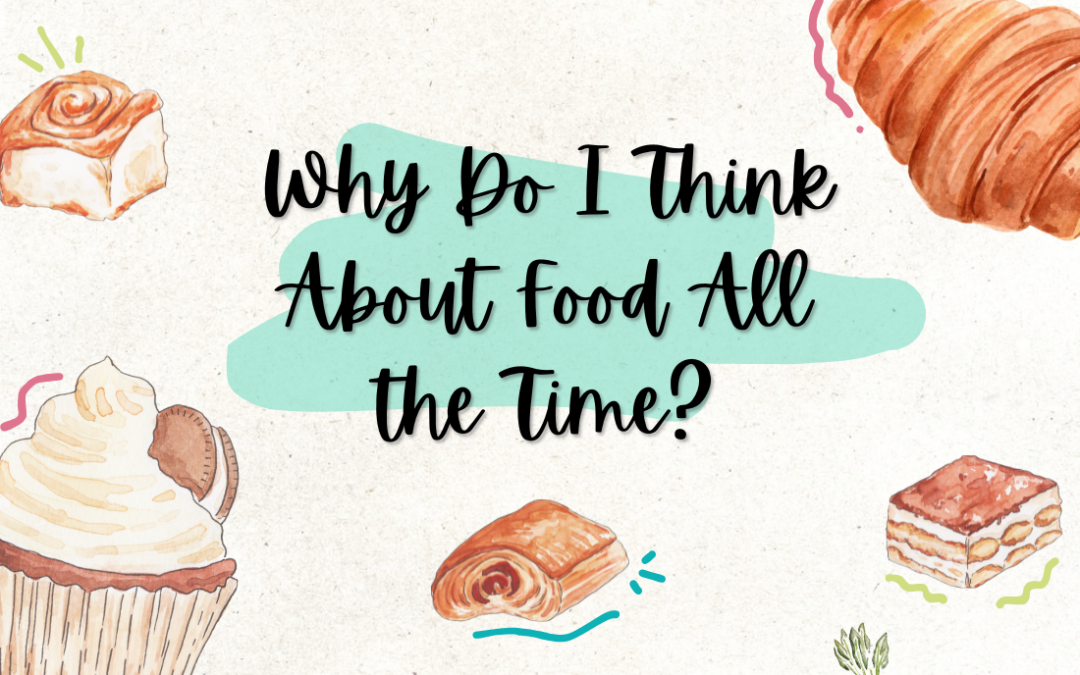




This was such a great article Jen! I am working on letting food thoughts pass without acting on them. Also, the graphics/pictures in this post are so lovely! Have a great week!
Thank you! I have a new design person who is helping so I can’t take credit 😉